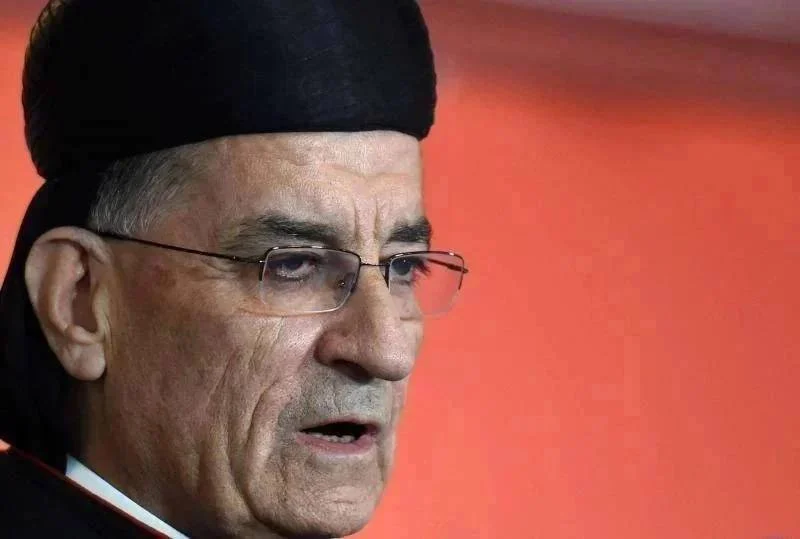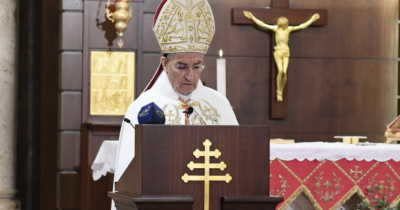
The head of the Maronite Church, Bechara al-Rai. (Credit: AFP/File photo)
BEIRUT — Head of the Maronite Church Bechara al-Rai's Sunday sermon caused an uproar in pro-Hezbollah circles.
After heavily denouncing the ongoing skirmishes between Hezbollah and Israel in his homely, a campaign was launched on social media and a hashtag accusing Rai of being a "traitor" is still tending on X until now.
Among the messages denouncing the Patriarch's stance, many users share a 2014 video of Rai defending Lebanese people living in Israel.
What do we know about this video and the statement he made?
The context in which the video resurfaced
The conflict between Hezbollah and the Israeli army in southern Lebanon, which erupted after the Oct. 7 Hamas attack in southern Israel and the deadly Israeli attacks on Gaza, has led to 174 deaths among Hezbollah with around another 20 civilians killed in the fighting.
Criticizing Hezbollah without naming the party, Rai said on Sunday that the situation in southern Lebanon was due to "the politics imposed" on the region's inhabitants and quoted what he described as testimonies from southerners, who criticize in particular the fact that, as a result of the bombings, their children are "deprived of education and entertainment."
Following this statement, the campaign was launched on X and pro-Hezbollah Jaafarite mufti Ahmad Kabalan published a statement criticizing Rai and accusing him of "stabbing the holiest and most important war on the southern front."
What is in the video?
Two video excerpts are mainly shared on social media. They show Rai addressing a congregation during his visit to Israel in May 2014.
Rai's visit to Israel was the first by a Lebanese religious dignitary since its establishment in 1948.
Lebanese law prohibits all contact with Israelis and Lebanese who travel to Israel are liable to high treason. However, exemptions exist for clergymen responsible for the 10,000 or so Maronites living in the country.
During his tour in Israel, and among other visits, he gave a speech at the Maronite parish in Haifa, during which he claimed that "The group that was forced to leave Lebanon in 2000, did it fight against Lebanon? Did it fight the Lebanese government? Did it fight Lebanese institutions? We call them traitors, I completely refuse this discourse," Rai said in the video.
Back then, he told LBCI's correspondent in the occupied territories, Amale Shehadeh, that he refused that the contact with these people "must be avoided, that they're just good for prison and oblivion," while also rejecting the idea of an amnesty for those among them who are guilty of crimes.
"Here the [Lebanese people living in Israel] like Lebanon more than any resident there," Rai also said in a second speech made during the same visit.
Who are the Lebanese who left for Israel in 2000?
Around 7,500 Lebanese, some of whom are accused of collaboration with Israel for having fought in the ranks of the South Lebanon Army (SLA) or for having worked on the other side of the border, now live in Israel.
The SLA was a predominately Lebanese Christian militia created by dissidents from the Lebanese army and composed of around 5,000 men. The SLA fought against Palestinian fedayeen and Hezbollah with Israel's military support, before disintegrating as Israeli forces gradually withdrew from southern Lebanon in 2000. Considered traitors, most of its members fled Lebanon and sought refuge in Israel.
In 2011, the Lebanese Parliament passed a law proposed by the Free Patriotic Movement and supported by the Lebanese Forces and the Kataeb party to regularize the situation of these Lebanese. The law provides for the safe return of all those who did not play an active role in the SLA, mainly women and children, and a fair trial for those considered to be collaborators. But the implementing decrees have never seen the light of day, notably due to Hezbollah's opposition, despite its alliance with the FPM in 2006, which provides for the possibility of both parties agreeing a solution for these exiles.
Who did Rai talk about back in 2014?
Rai's speech in 2014 created a debate about whether he was defending the South Lebanon Army's militants or just their families and other Lebanese people living in Israel.
Back in 2014, media outlets close to Hezbollah heavily criticized Rai following the speech as they called for his apology and accused him of being a traitor.
Meanwhile, church spokesperson Walid Ghayad had told al-Jazeera back then that Rai meant to address "families, especially women and children" in his speeches that were made during his visit to Israel. Ghayad added that Rai distinguishes between traitors and their families and that he never meant to address traitors "who are publicly known for dealing with Israel, their affairs are handled by the state and they are subject to Lebanese laws."
Following the visit, then-Hezbollah MP Ali Mikdad had said that “some people went to occupied Palestine in order to convince some agents of the Israeli enemy to return.”
